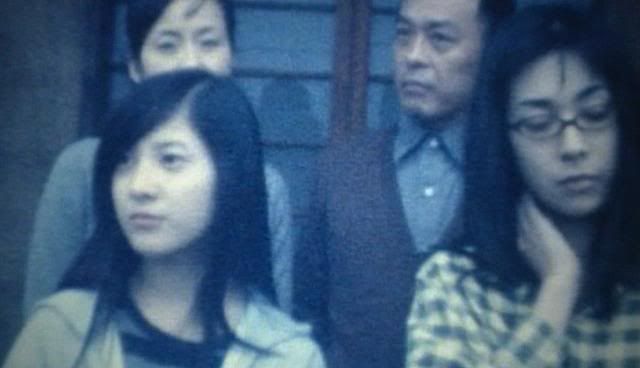
One of my favorite actors is Koji Yakusho. He has a way of melting into his characters and becoming them in a very basic, natural manner. I hadn't realized he was in Unagi, (or had forgotten), so I was pleasantly surprised to witness another brilliant yet subdued performance on his part. Brilliant in 1997's Cure, acclaimed for his role in 1999's Charisma, 2000's Korei, his brief appearance in 2001's horror masterpiece Kairo, a Jeremy Irons-like duplicitous role in 2003's Doppelganger, his resume is one of the best. This was the first non-horror film I've seen of his. In Unagi, he plays Takuro, a white-collar salaryman who works in the city and resides in a small countryside village with his beautiful wife named Emiko. He has a long commute to and from his job and a seemingly dull or uneventful job (although we only get a minimal glimpse of it at the very beginning of the film). On a regular basis, he joins friends, acquaintances and perhaps colleagues to fish the sea on a pier outside of the close-knit village.
Takuro squeezes onto the same train everyday, probably in the same car... well, you get the idea of a regimented lifestyle, but one Takuro seems to willingly get by with. One particular day on the trip home, he pulls an anonymous note from his pocket and reads that his wife has been having an affair, usually whilst he is fishing. I wondered why the movie didn't set the affair to coincide with him being at work, but it makes more sense when you see it. He makes his walk down the narrow road to his home and greets his smiling wife. He ditches his suit , accepts a prepared, boxed dinner (lovingly wrapped) and leaves per usual for much fishing. It's eerie to hear Emiko ask "How long will you be gone?" as a viewer because we obviously know what's happening. Takuro doesn't miss a beat and responds that he'll 'be gone as long as usual'. Takuro spends a shorter time at the pier tan usual and bids the others farewell. On the way, he reminisces about the anonymous note; it also mentions what type and color the man arrived in. When he arrives to his home, he does find a white sedan parked and half-covered with brush next to the house. He sneaks around the house to a window and peeks through the window. What follows is the reason he's sent to prison, where (at another unknown point) he catches and begins to confide in an eel (he's lost all trust in people) which he keeps in a prison fountain with help from a few guards. The guards allow him to keep the eel when his parole officer assumes custody of Takuro upon his release. Takuro begins to reestablish himself by purchasing a rundown barber shop in a tiny coastal town full of interesting characters and soon a mysterious woman enters the town. She brings a mix of disruption, controversy and maybe hope to the residents of the small coastal town and Takuro himself.
To Unagi's benefit (or not), the story is told with an array of styles. It doesn't stray form it's intention to take Takuros plight seriously, but at times, it seemed to go off on a tangent concerning other characters. I believe this was detrimental to bringing Takuro's redemption to fruition. I'm not saying that developing the other characters is a mistake, I'm just saying that in this case it worked against a complete resolution. Hell, for all I know, that could of been the objective all along; for the ending to remain open-ended and unresolved fully. With characters like Akira Emoto's character Tamotsu (Maborosi, Doppelganger) as Takuro's level-headed, wise, father figure-type new friend, could conceivably live on past the ending. The film as a whole has that sort of natural feel to it and an uncanny sense of taking place in two different eras. Add a touch of hilarity now and then to ease the dramatic air and this turns out to be a surprisingly great movie.

